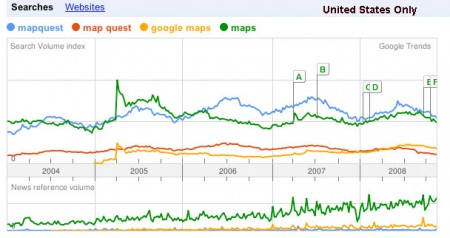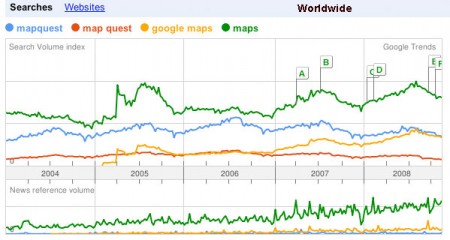Understanding Google My Business & Local Search
Search Trends for Mapquest & Google Maps –
Many folks in the search marketing world, myself included, have noted that, in most Hitwise reports on Map usage, Google Maps was gaining on on Mapquest and would soon surpass them in user visits. In a recent interview (soon to be published at SEL) I asked Mark Law what he would say about the Hitwise reports of Google Map’s market share gains?
Mark: We see Google Maps in many ways an endpoint of a Search query and because of that, their growth is inherent to their business. The people that come to MapQuest are here for the explicit purpose of finding Where is it, How do I get there and What’s nearby. Google Maps may be gaining ground in terms of UVs but our user engagement and value proposition is very different than Google Maps. Visitors to MapQuest are far more engaged as we’re actually a destination website.
Consumers actively look and search for MapQuest. In fact, MapQuest is the 8th most searched term, according to Hitwise. Google Maps is 57th.
MapQuest also has a deeper level of User engagement as demonstrated by 113% more pages viewed per visitor per month than Google maps and visitors spending 78% more minutes (13.8 compared to 7.8 minutes) on MapQuest verses Google Maps.
I was curious about his response and wanted to explore the idea of what people were in fact searching for and did the trends bear out Mark’s optimism. Google Trends, while not a perfect source for data, seemed a reasonable source of the information and a good proxy for user intent if not action.
It appears that in North America, Mapquest is very strong and has not given an inch to Google Maps on the search front. World wide that doesn’t appear to be the case. The following chart was generated in Google Trends using the branded phrases: Mapquest, Map Quest, Google Maps and the more generic phrase: Maps.
Search Trends – Mapquest, Map Quest, Google Maps and Maps – US Only
This search seems to reflect the fact that Mapquest has very strong brand equity and loyatly in the U.S. The chart for Canada shows very similar trends. The trends for the phrases Mapquest & Map Quest, have shown consistent strength and even some upward direction over the past 4 years. The search on Google Maps, after the initial spike, has not had a dramatic upswing and does appear to be moving in a direction to overtake Mapquest.
The charts worldwide however show a dramatically different trend that very much mirrors the Hitwise charts.
Search Trends – Mapquest, Map Quest, Google Maps and Maps – Worldwide
Mapquest obviously has the strength of their brand, a strong user loyalty and strong support in the North American markets. Google Maps seems to be doing better in search phrase battle in much of the rest of the world. Google has the incredible power of their own search engine to bring to bear on passing searchers onto their Maps product with both links on the main page, Universal Local results and for searches on phrases like the more generic, non-branded phrase Maps.
So the question is can Mapquest stave off the pursuer, Google? Is brand and engagement enough or will control of the search world ultimately give Google the tools to take over Mapquest in North America as well?
© Copyright 2025 - MIKE BLUMENTHAL, ALL RIGHT RESERVED.


Comments
8 Comments
Mike – you raise some good points – very interesting stats about MapQuest’s user engagement.
But I wonder if the reason that “google maps” has less search volume than “mapquest” is because if someone is already at Google, they’ll do one of two things:
1) Click the “Maps” link in the top-left to go directly to Google Maps
or
2) Perform a search with local intent (i.e. italian restaurant in Olean, NY) and click through to the map results from the 10-pack
I think you hinted at that in the next to last paragraph:
“Google has the incredible power of their own search engine to bring to bear on passing searchers onto their Maps product with both links on the main page, Universal Local results and for searches on phrases like the more generic, non-branded phrase Maps.”
I guess it just makes sense to me that not as many people would use “google maps” as a search term in Google (then again, I do have a bit of tunnel vision).
Hi Jim
Certainly as Mark Law pointed out google is a search oriented growth….users who need something quick and need it now. And you are right Google is making every effort to “steal” traffic from Mapquest via multiple avenues…that being said those people searching for Mapquest are looking for well….Mapquest. Google is the “new browser” and many folks use it to find their destination. I think this chart shows that.
Long haul they are vulnerable, thats for sure, but at least for now and at least in North america, if not the rest of the world, Mapquest seems to be holding thier own.
The fact that they have started onto feature upgrades is a positive sign and offers some long term postive direction as well.
I hope that there is room long haul for two strong Maps site, not just one.
Stay tuned for my intereview with Mark Law and let me know if you think there will be a competitve landscape.
Mike
Hey Mike,
I have been awaiting your Mark Law interview. This is an interesting precursor to that.
I, for one, want to see MapQuest hold its own. Competition is healthy. Options are power. Google shouldn’t be everything to everybody.
That’s pretty amazing that MapQuest is the 8th most searched term. Is that what Mark meant by them being a ‘destination website’, or do you think he meant something else? I wondered about that.
I also find it so odd that people search for things like ‘MapQuest’ rather than going to the URL. People use search in weird ways, don’t they?
Miriam
Hi Miriam
I too would like a strong competitor. From where I sit, it would even be better if they managed to keep Google at bay particularly in North America.
By “destination website” he meant that but also that Mapquest was a site that people thought to go when they needed information. As in folks went to Mapquest with intentionality and knew what they were looking for, and stayed around and found it….as opposed to Google Maps which is search found site…and thus doesn’t have the deep engagement that people are looking for in making their way to Mapquest. IE it attracts people on its own merit rather than as a side product of search. It is a phrase that originates in the retail industry…WalMart is the “destination” but people might stop at Payless as an outcome of that visit to WalMart.
As Andrew pointed out the other day, Google is the new browser. I too always find it strange when I talk with someone on the phone and say enter this url in the browser and they say: UH? I just go to Google and enter it there. It is quite common.
Obviously people use it as a way to get to Mapquest even though with minimal extra effort they could get their directly.
Mike
Andrew is right about that.
Thanks for expanding on the concept of a destination website. I can see that.
I spoke with a client a few months ago who had never noticed the URL bar on her browser before. Not kidding. She thought that the Google search box was the way to get to a URL. I felt so surprised by that.
Miriam
@ Miriam
I think the phenomena that you speak of where folks don’t know what the URL bar is is much bigger than you or I could conceive. I ran into the same thing several days ago and it surprised me. The more I thought about it though the more it made sense….they arn’t 100% sure of the url…its easier to just learn to use Google and get to it 100% of the time in 2 steps rather than have a certain % of failures in entering the URL in the bar.
Mike
[…] Google has a much stronger presence than MapQuest in much of Asia & Africa while Mapquest has traditionally been strong in North America. It would be of interest to see the US and European numbers broken out as well. I […]
[…] visits, user engagement with Maps has historically been shallow. Mark Law of Mapquest noted in a November interview that: MapQuest also has a deeper level of user engagement as demonstrated by 113% more pages […]
Comments for this post are closed.